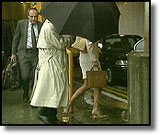
|
Government Backs Diana in Landmines RowPrincess Diana has received Government backing over her right to meet MPs at Westminster to discuss the eradication of landmines. Junior International Development Minister George Foulkes said in the House of Commmons that the Princess should have been allowed to visit the Commons for a meeting on outlawing landmines without the discussion being condemned as "political". Earlier Princess Diana announced her decision to pull out of the meeting following strong criticism from backbench Conservative MPs. She made the decision after arriving back in London from a visit to the United States. A statement from Kensington Palace said, "Details of the meeting have... now been made public and a political dimension has been introduced to its purpose. As a consequence, the Princess's attendance has been made untenable." The statement added that she had invited the organisers of the meeting to brief her at a later date. Mr Foulkes told MPs: "The matter is humanitarian. It is not party political. Indeed, some Opposition Members, of both Houses, have been involved in the all-party landmine eradication group."
Diana has been actively calling for a worldwide ban on land mines since her visit to Angola in January, when she publicised the plight of the victims of the devices. She received an important boost last month when the Prime Minister announced that Britain would ban manufacture and trade in land mines, something the previous Conservative government had refused to do. The meeting was organised by the Commons All-Party Landmines Eradication Group. And was to be addressed by Martin Bell, the independent Mp for Tatton, and Dr David Eimerl, an expert on land mines.
Mr Bell said that he was "saddened" by Diana's decision. "It was going to be a private meeting. The issue is not political at all," he added. "I regret that she is not going to be there because I think her work in the cause has been inspiring." Some Conservatives had been insisting that because Britain is a constitutional monarchy, and as such members of the Royal Family are supposed to avoid political involvement. "She is entering the political process," said Conservative MP David Wilshire, referring to Diana's original intention to attend the meeting. "That raises fundamental questions about the role of the monarchy." Another Tory MP, Andrew Robathan, told the BBC he was glad that Diana had now decided not to attend.
Earlier, the Landmines Eradication Group's chairman, Frank Cook MP, told reporters: "We need the high profile support of people like the princess to force other governments to follow the British example and ban this disgusting trade in land mines." The United Nations estimates that around 111 million unexploded land mines are scattered around 75 countries, as the result of war and conflict. More than 2,000 people are killed or maimed by land mines each month. |
Diana, Princess of Wales, 1961-1997
Conference 97
Devolution
The Archive
News |
Issues |
Background |
Parties |
Analysis |
TV/Radio/Web
Interactive |
Forum |
Live |
About This Site
News |
Issues |
Background |
Parties |
Analysis |
TV/Radio/Web
Interactive |
Forum |
Live |
About This Site
© BBC 1997 |
politics97@bbc.co.uk |


